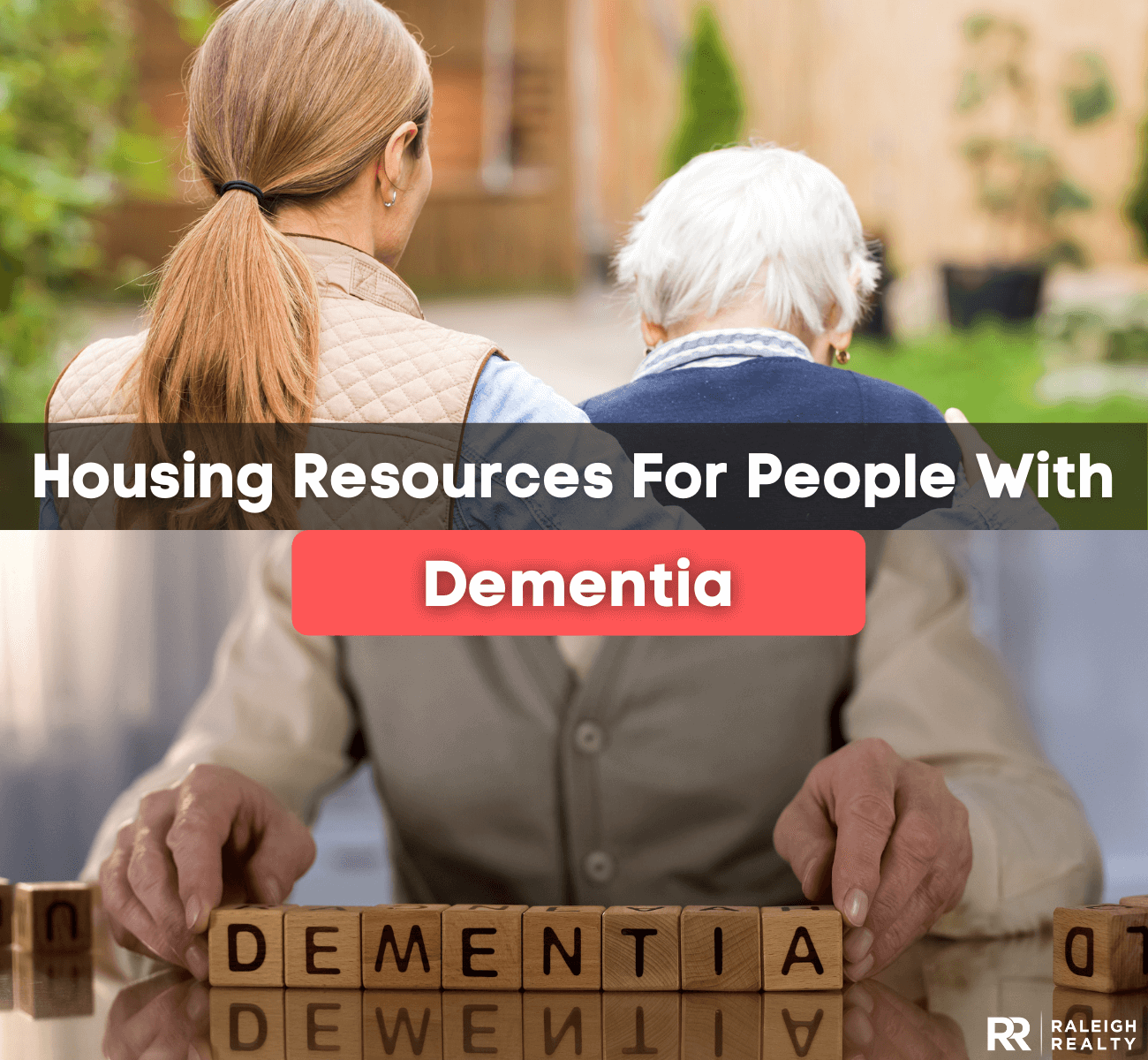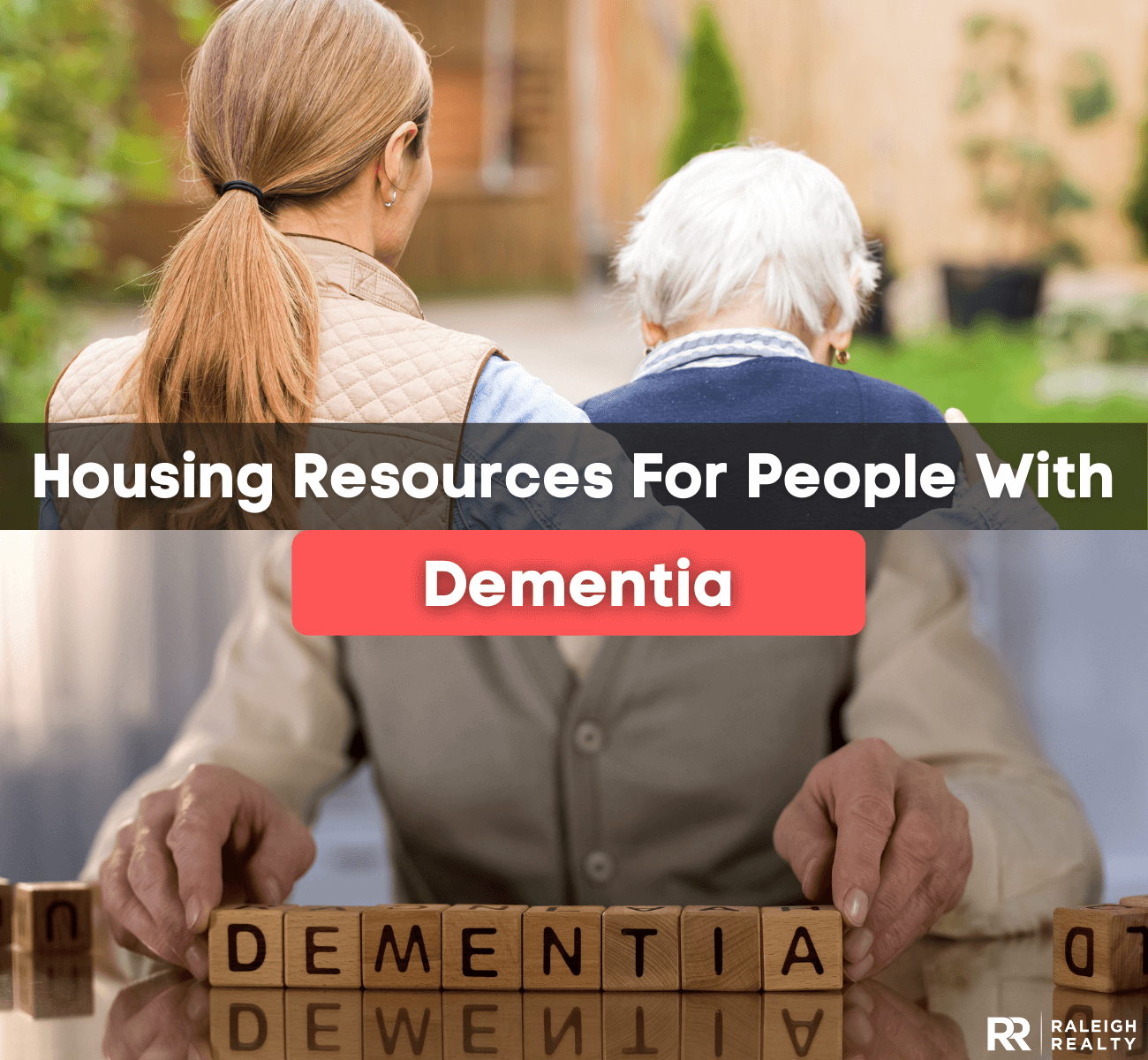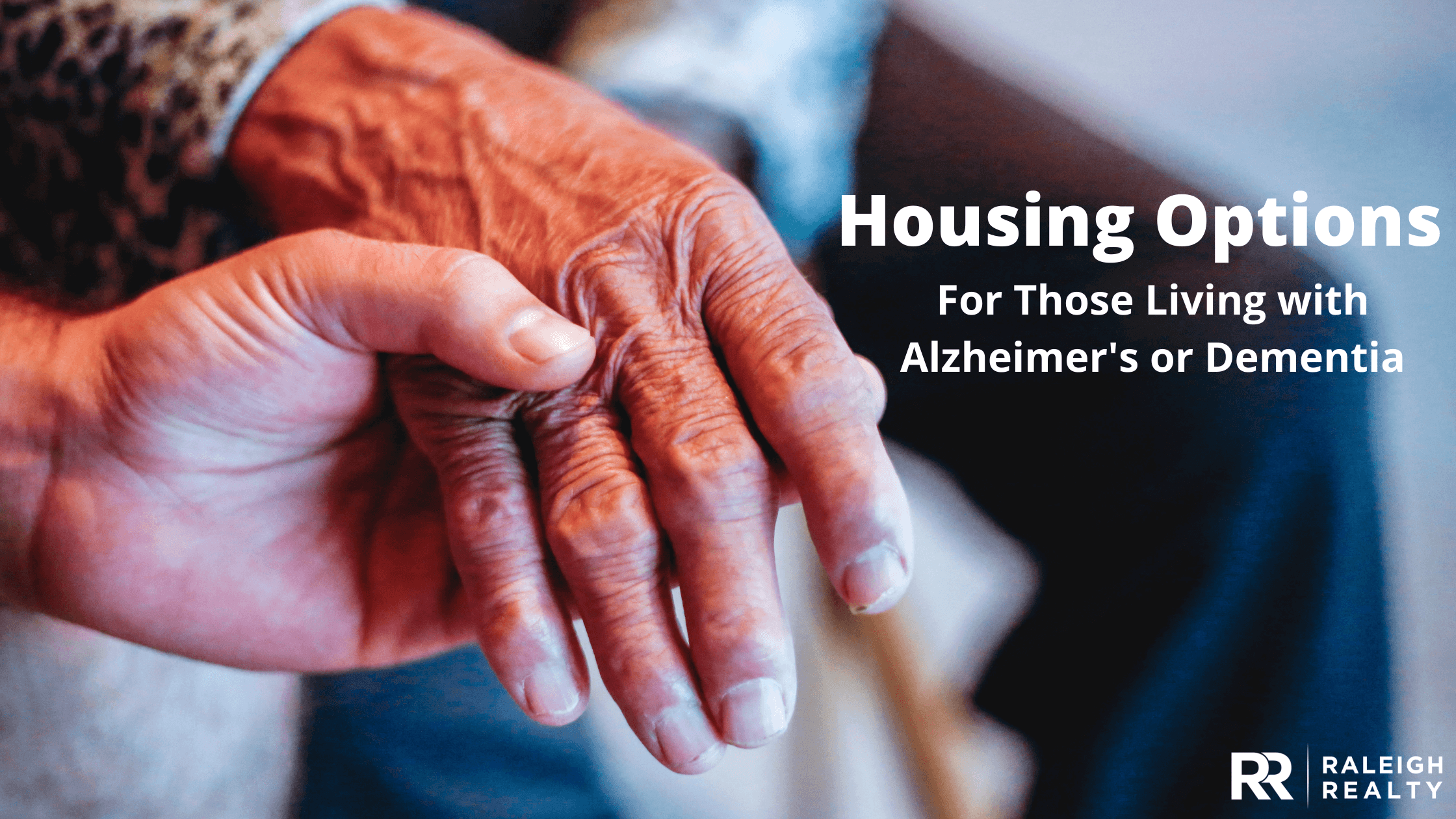Housing Resources for People With Dementia or Alzheimer's

Resource Guide for Homebuyers With Dementia or Alzheimer's
You hear it from healthcare professionals and various media sources all the time. “Eating a certain type of diet or making slight changes to your lifestyle will help to protect your mind against Alzheimer’s and other related Dementias”. But what if you or a loved one have already received a diagnosis? Then what? Amongst the long list of medical care options that now have to be taken into account, where is that care going to be provided to them? Will it be in their current home so they can be in a more comfortable environment? Or will they need to reside in a more specialized facility so they may be provided around-the-clock care?

Let’s take a more in-depth look at Alzheimer’s and other dementias, as well as what housing and care options are available for you and your loved ones.
Chapters
Dementia Vs. Alzheimer’s
Dementia is a blanket term used to describe a loss of memory and other mental abilities severe enough to hinder everyday life. Dementia is caused by actual physical changes that occur over time in the brain. There are many different types of dementia, some related to other underlying diseases such as Alzheimer’s Disease. Alzheimer’s is currently the most common form of dementia, and can be diagnosed anywhere from the age of 30 (which is rare) to age 65 and on. The symptoms, stages, and behaviors of Alzheimer’s varies from individual to individual and coincides with the severity of their diagnosis. For instance, a person who is just diagnosed may only have slight memory problems accompanied by anxiety from their diagnosis, whereas a person who is in the later stages of the disease may no longer recognize their loved ones, while also requiring assistance with everyday care.
Worldwide, there are over 50 million people living with Alzheimer’s and other dementias. On average in America, it kills more people per year than both breast and prostate cancer combined. So what exactly causes Alzheimer's or other types of Dementia? Essentially, the loss of memory and thinking skills observed in a person with these conditions is caused by a buildup of proteins in the brain called plaques, resulting in the loss of cell tissue and death.
There are a number of different risk factors associated with the disease, the most common being age, but can also include genetics, family history, and other risk factors such as traumatic brain injuries also referred to as TBI’s.
Housing Resources
So what if you have someone in your family who has received a diagnosis? What type of care will they need? And will it be able to be provided within their current home? Experts advise families to think about some of the following questions when deciding between care options for their loved ones:
-
Is there enough space to provide care in their current home?
-
What are they currently able to do for themselves?
-
Is there someone available to assist them throughout the day or would you need to hire out for those services?
-
What kinds of medical care are available nearby?
-
What kinds of home care services are available to you within your community?
In the event that a person living with Alzheimer’s can no longer be provided the care that they need within their own home, there are a number of housing options available to them within the local community. There are four main types of housing options and are detailed as follows:
-
Board and Care Homes- Board and Care Homes, sometimes referred to as group homes or residential care facilities, are small private facilities usually housing up to twenty people or less. Residents of these facilities receive around-the-clock personal care and meals from trained staff. However, medical and nursing support is sometimes not provided on-site at these facilities. This would be an option for a family with a recent diagnosis who would feel better knowing someone is there to look after their loved one at all times if they were unable to do it themselves.
-
Assisted Living Facilities- Assisted living facilities can range from anywhere from 20 residents to upwards of 100 people. In these facilities, residents usually have their own rooms but share common areas such as dining rooms, recreation rooms, etc. These facilities do provide their residents with medical care, as well as help with laundry, meals, and personal care. Around-the-clock security and supervision are included in order to maintain patient safety.
-
Nursing Homes- Very similar to assisted living facilities, nursing homes have more of an intense focus on medical care. Some residents only stay in these facilities for brief periods of time following hospital stays, but can also become permanent residents if they are in need of ongoing medical care and supervision.
-
Continuing Care Retirement Communities (CCRC’s) - Sometimes also referred to as life care facilities, these communities offer different levels of care based on patient requirements. Many of these facilities offer independent housing options, such as apartments or houses to their residents who may not yet be in need of around-the-clock supervision, but then adjusts their living arrangements as necessary as a resident requires more care. Those residents who can no longer live independently are then moved into assisted living environments, and then eventually are transferred to nursing home environments once their overall mental and physical condition requires it.
-
Memory Care Facilities- These facilities are dedicated to those individuals specifically living with Alzheimer’s or dementia. These types of facilities offer enhanced safety procedures, around-the-clock care, and activities geared towards enhancing cognitive abilities and social opportunities amongst its residents.
If you are still the main caregiver for your loved one, whether it be at home or in one of the facilities listed above, respite care can also be arranged. Respite care is short-term relief for the primary caregiver and can range from an afternoon to an entire day. Respite services are charged by the area and are generally not covered by insurance programs, however, Medicare and Medicaid may help cover some of the finances.
Paying for Care
So how will you pay for their needs? A person with dementia may have a Medicare plan, private insurance, an employee or a retiree health plan that will help provide financial assistance for proper care:
-
Medicare- Medicare is a federal government program that pays for medical expenses of those ages 65 and older. This program provides some home healthcare under certain conditions but does not usually pay for personal aides for daily or long-term nursing home care.
-
Medigap- Medigap supplements gaps in Medicare coverage, such as paying for coinsurance.
-
Medicaid- Medicaid is a combined state and federal program designed to help families with low income. This program will cover the costs of medical care as well as the costs of some long-term care for those with low income and who meet other eligibility requirements. Eligibility for coverage varies from state to state.
-
Social Security Disability Insurance (SSDI) - Provides workers younger than 65 with Social Security Disability. This would be a viable option for those individuals who may have been diagnosed with Early Onset Alzheimer’s. In order to qualify, the person must meet the Social Security Administration's definition of disability.
-
Supplemental Security Income- Guarantees a monthly income for those ages 65 and older with a limited income and who are disabled or blind. Eligibility for this type of financial assistance would also require meeting the Social Security Administration’s definition of disability.
-
Disability Insurance- This type of insurance provides an individual with coverage when they can no longer work due to illness or injury. With an employer’s disability insurance policy, 60-70% of their gross total income may be provided. NOTE: This insurance plan must be in place before symptoms of Alzheimer’s or dementia appear.
In addition to government assistance and insurance programs, personal assets such as investments, stocks, and real estate can aid in care payment

Your Current Living Situation
When receiving a diagnosis of Alzheimer's Disease or other related dementias, one of the major things you or your family members may end up looking for are resources to help with your current living situation. This can be a result of a worsening condition, where the patient requires more specialized attention, or possibly the sale of the home will help with the costs of their care. Other reasons may include your current living situation not being conducive to your health condition, especially if you are living alone. Readying a home so that it can be listed on the real estate market can be a daunting task, but there are a few steps that can be taken to alleviate some of that stress for you and your family. Before selling, you will want to have a plan on where you are going to live next whether that's buying a home closer to family, or moving in with loved ones. If you do decide to move, first, contact a local licensed real estate agent to discuss the selling process should you choose this path. There are many resources to help people age in place at home as well while using our home safety checklist.
Treatment and Maintenance: A Team Effort
All in all, a diagnosis of Alzheimer’s or dementia can be scary not only for the patient but for their family members. There are a lot of different aspects of care that need to be considered, not just limited to physical and mental care, but also the environment where that care is to be provided. Whether it be in a specialized facility or in the comfort of your own home, there are many resources available to you to help you and your family through difficult times.
Helpful Resources
Below is a list of online resources that will provide you with more information on Alzheimer’s Disease and other Dementias, as well as provide you with further resources on how to provide the best care possible for your loved ones.
- Alzheimer's Association - An association dedicated to ending Alzheimer’s and other dementias via global research, risk reduction, and early detection.
- Alzheimer's Research Association - A national non-profit organized in an effort to provide resources to Alzheimer’s caregivers.
- Long-Term Care.gov - An informational website that details the various methods of care that can be given to those with Alzheimer’s and dementia, as well as what may or may not be covered by insurance, Veteran’s Affairs, or other state programs.
- National Institute on Aging - The NIA is one of the twenty-seven institutes of the National Institutes of Health (NIH). It is the primary Federal agency supporting and conducting
Alzheimer’s research.
-
Alzheimer's Foundation of America - Founded in 2002 by a caregiver whose mother lived with Alzheimer’s from 1980-1992, its mission is to provide support to the families and caregivers affected by the disease, as well as to provide research towards better treatment and cure.
Information of Cost of Care
The cost of care will vary depending on the level of care required, geographic region, and care setting. Below are some online resources that can help you determine the cost of care for your family member. Caregiver assistance funding varies from state to state, so make sure to research what the requirements for financial assistance are for your specific region!
- Cost of Care Survey
- Medicaid - For more information on Medicaid and what types of care are financially covered in your state.
Alzheimer's Research Association Grant - As a result of Covid-19, there are a number of families struggling to provide proper care for their loved ones. This is due to financial stressors, as well as a greater risk of contracting covid if you have an underlying condition. In order to help with these challenging times, the ARA is now offering grant programs to caregivers. Click the link above to be directed to the grant application!

Ryan Fitzgerald
Hi there! Nice to 'meet' you and thanks for visiting our Raleigh Real Estate Blog! My name is Ryan Fitzgerald, and I'm a REALTOR® in Raleigh-Durham, NC, the owner of Raleigh Realty. I work alongside some of the best Realtors in Raleigh. You can find more of my real estate content on Forbes, Wall Street Journal, U.S. News and more. Realtor Magazine named me a top 30 under 30 Realtor in the country (it was a long time ago haha). Any way, that's enough about me. I'd love to learn more about you if you'd like to connect with me on Facebook and Instagram or connect with our team at Raleigh Realty. Looking forward to connecting!

